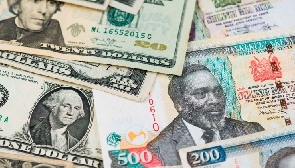 The weakening Kenya shilling is raising the value of returns on assets based on foreign currencies
The weakening Kenya shilling is raising the value of returns on assets based on foreign currencies
The weakening of the Kenya shilling is raising the value of returns on assets based on foreign currencies, cushioning diversified investors from local economic challenges.
Equities and fixed income investments tied to the US dollar and regional currencies have posted relatively better returns at a time when the local currency has depreciated significantly over the past two years.
Most of the stocks listed on the Nairobi Securities Exchange (NSE) have recorded price declines and—until recently— the interest rates on local bonds offered little protection against inflation.
Investors holding more diversified assets are meanwhile booking substantial gains on the part of their portfolios not linked to the local currency.
The interest rate on dollar money market funds offered by the likes of Sanlam and CIC Asset Management, for instance, has increased to highs of six percent from lows of 3.5 percent at the start of the year.
Holders of the fixed income assets have further gained from the strengthening of the greenback against the local currency.
The dollar has gained 24.9 percent against the shilling in the past 12 months alone to fetch 152 units of the local currency.
Those investing in foreign stock exchanges have also seen their dividend earnings rise, reflecting the impact of the shilling’s relative weakness.
They include shareholders in companies from the regional market and those cross-listed on the NSE. They are MTN Uganda, Bank of Kigali, and Umeme Limited.
Neighbouring countries have also seen their currencies appreciate against the shilling, inflating the value of the dividends paid by their companies when remitted to Kenya-based investors.
The Uganda shilling, for instance, has gained 24.9 percent, followed by the Tanzania shilling (16.1 percent) and Rwandan Franc (six percent) compared to the Kenya shilling over the past 12 months.
Besides portfolio investors, Kenyan multinational companies with diversified operations in the region are also gaining from the inflated dividends and assets in their foreign subsidiaries.
They include banks such as Equity Group, NCBA Group, I&M Holdings and DTB Group.
While local equities are still in the doldrums, returns on the country’s domestic bonds and Treasury bills have recently become more attractive with a rise in interest rates on new auctions that now approach 18 percent.
This is more than double the inflation rate which stood at 6.9 percent in October. The cost of living has slowed down from a high of 9.6 percent in October last year.
The Kenya shilling has, however, continued to weaken, eroding purchasing power in an economy that imports most of its goods from foreign suppliers who are paid in hard currencies led by the US dollar. Officials have linked the shilling’s depreciation to an earlier overvaluation of the currency, which they say is now being eliminated.